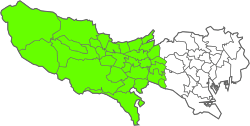Western Tokyo
Western Tokyo, also known as the Tama area (多摩地域, Tama chiiki), Tama region (多摩地方, Tama-chihō) or toka (都下), in the Tokyo Metropolis consists of 30 ordinary municipalities (cities (市 shi), towns (町 machi) and one village (村 mura)), unlike the eastern part which consists of 23 special wards.[1]
Western Tokyo | |
|---|---|
 Western Tokyo (green) within Tokyo Prefecture | |
| Country | Japan |
| Island | Honshū |
| Region | Kantō |
| Prefecture | Tokyo |
| Area | |
| • 26 cities, 3 towns, 1 village | 1,160 km2 (450 sq mi) |
| Population (October 1, 2018) | |
| • 26 cities, 3 towns, 1 village | 4,233,493 |
| • Density | 3,650/km2 (9,500/sq mi) |
Before it was transferred to Tokyo in 1893, the Tama area, then also still often referred to as the "three Tama" (三多摩, san-Tama) (referring to the West, North and South Tama counties it consisted of) had formed the Northern part of Kanagawa.[2]
Overview
Whereas in the east of Tokyo Metropolis the 23 special wards occupy the area that was formerly Tokyo City, the west consists of 30 other ordinary municipalities: cities (Nos. 1–26), towns (Nos. 27, 28, 30) and a village (No. 29).
List of cities, towns and village
| No. | Flag | Name | Japanese (kanji) | Hiragana | Population (as of October 2016) |
Density (/km²) |
Area (km²) |
|---|---|---|---|---|---|---|---|
| 1 | Hachiōji | 八王子市 | はちおうじし | 577,254 | 3,097 | 186.38 | |
| 2 | Tachikawa | 立川市 | たちかわし | 180,214 | 7,398 | 24.36 | |
| 3 | Musashino | 武蔵野市 | むさしのし | 147,607 | 13,443 | 10.98 | |
| 4 | Mitaka | 三鷹市 | みたかし | 191,408 | 11,657 | 16.42 | |
| 5 | Ōme | 青梅市 | おうめし | 134,857 | 1,305 | 103.31 | |
| 6 | Fuchū | 府中市 | ふちゅうし | 263,835 | 8,965 | 29.43 | |
| 7 | Akishima | 昭島市 | あきしまし | 111,942 | 6,456 | 17.34 | |
| 8 | Chōfu | 調布市 | ちょうふし | 237,637 | 11,012 | 21.58 | |
| 9 | Machida | 町田市 | まちだし | 433,938 | 6,065 | 71.80 | |
| 10 | Koganei | 小金井市 | こがねいし | 124,712 | 11,036 | 11.30 | |
| 11 | Kodaira | 小平市 | こだいらし | 194,757 | 9,496 | 20.51 | |
| 12 | Hino | 日野市 | ひのし | 188,990 | 6,860 | 27.55 | |
| 13 | Higashimurayama | 東村山市 | ひがしむらやまし | 150,101 | 8,757 | 17.14 | |
| 14 | Kokubunji | 国分寺市 | こくぶんじし | 126,317 | 11,022 | 11.46 | |
| 15 | Kunitachi | 国立市 | くにたちし | 75,022 | 9,205 | 8.15 | |
| 16 | Fussa | 福生市 | ふっさし | 58,184 | 5,727 | 10.16 | |
| 17 | Komae | 狛江市 | こまえし | 83,003 | 12,990 | 6.39 | |
| 18 | Higashiyamato | 東大和市 | ひがしやまとし | 84,480 | 6,295 | 13.42 | |
| 19 | Kiyose | 清瀬市 | きよせし | 75,400 | 7,370 | 10.23 | |
| 20 | Higashikurume | 東久留米市 | ひがしくるめし | 116,309 | 9,030 | 12.88 | |
| 21 | Musashimurayama | 武蔵村山市 | むさしむらやまし | 71,804 | 4,687 | 15.32 | |
| 22 | Tama | 多摩市 | たまし | 147,822 | 7,036 | 21.01 | |
| 23 | Inagi | 稲城市 | いなぎし | 90,774 | 5,051 | 17.97 | |
| 24 | Hamura | 羽村市 | はむらし | 55,004 | 5,556 | 9.90 | |
| 25 | Akiruno | あきる野市 | あきるのし | 80,242 | 1,092 | 73.47 | |
| 26 | Nishitōkyō | 西東京市 | にしとうきょうし | 203,258 | 12,905 | 15.75 | |
| 27 | Mizuho | 瑞穂町 | みずほまち | 32,867 | 1,951 | 16.85 | |
| 28 | Hinode | 日の出町 | ひのでまち | 17,226 | 614 | 28.07 | |
| 29 | Hinohara | 檜原村 | ひのはらむら | 2,073 | 19.7 | 105.41 | |
| 30 | Okutama | 奥多摩町 | おくたままち | 5,023 | 22.3 | 225.53 | |
| Overall | 4,233,493 | 3,650 | 1,160 | ||||
The towns of Hinode, Mizuho, and Okutama, and the village of Hinohara make up the non-contiguous Nishitama District.
The offshore islands of Tokyo (including the Bonin, Volcano, Izu island chains, and the uninhabited islands of Okinotorishima and Minamitorishima) are not considered part of Western Tokyo.
History
Under the Ritsuryō system, Western Tokyo was part of Musashi Province. The provincial capital was at Fuchū. The provincial temple (kokubunji) was at Kokubunji and the principal shrine (ichinomiya) was at Tama.
Western Tokyo previously consisted of three districts:
- Nishi-Tama District (西多摩郡, Nishi-Tama-gun) (lit. "Western Tama") encompassed the present-day cities of Akiruno, Fussa, Hamura, and Ōme; in addition to the four municipalities (3 towns and a village) that still remain a part of the district.
- Minami-Tama District (南多摩郡, Minami-Tama-gun) (lit. "Southern Tama") covered the area now occupied by Hachiōji, Hino, Inagi, Tama, and Machida. With the formation of Inagi (the last city to be created in Tokyo in 1971), Minamitama District ceased to exist.
- Kita-Tama District (北多摩郡, Kita-Tama-gun) (lit. "Northern Tama") consisted of the locations of the present-day cities of Akishima, Chōfu, Fuchū, Higashikurume, Higashimurayama, Higashiyamato, Kiyose, Kodaira, Koganei, Kokubunji, Komae, Kunitachi, Mitaka, Musashimurayama, Musashino, Nishitokyo, and Tachikawa, as well as some land now in Setagaya. With the establishment of the city of Musashimurayama in 1970, Kitatama District ceased to exist.
References